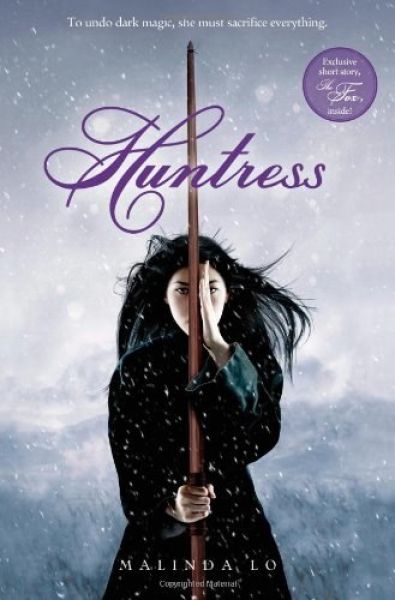Way Out in the Country
Huntress
By Malinda Lo

21 Feb, 2020
Malinda Lo’s 2011 secondary-world fantasy Huntress shares a setting with the author’s 2009 Ash.
The seasons are out of balance and the economy is suffering. Several of the Kingdom’s provinces are on the verge of rebellion. Keeping rebellious lords in line requires all the king’s attention. When the queen of the Xi (fairies) requests that he visit and confer, the king declines to go.
He sends an embassy in his place. The personnel: Kaede (the daughter of the king’s closest advisor), Taisin (a young sage), Con (the king’s son), and a host of expendable extras.
Don’t get too attached to the extras.
It is a dangerous mission — which is why all the personnel might be considered expendable. Kaede declined an advantageous marriage and her father is displeased with her. The king has a brand-new bride who might not mind being the mother of a new crown prince should the current one vanish. Taisin? Replaceable.
During the journey, it turns out that Taisin is exactly Kaede’s type. Conveniently, Kaede is Taisin’s type. Too bad that there is no guarantee either will survive the mission and that sages are required to be celibate.
Many miles and several unlucky servants later the (smaller) party arrives at the fairy court. Their troubles are only beginning. The queen admits that the fairy realm has something to do with the crisis in the neighboring Kingdom. The queen’s half-human adopted child Elowen is meddling with the seasons in retaliation for being passed over in the succession to the fairy throne. He has holed up in his castle of ice. The queen is reluctant to attack or punish him. But the newcomers could perhaps …
The embassy, now band of adventurers, sets out to storm the castle of ice and kill the upstart. Or die trying.
~oOo~
The Kingdom is simply the Kingdom because things only need names if there is more than one of them. No doubt the Kingdom acknowledges no equals.
Kaede refused to marry her father’s choice because the man was unappealing; moreover, he was a man and she is interested only in women. [Editor’s note: Taisin is a woman? James, you didn’t tell us that! Hmmmph.] Now it’s true that same-sex relationships are accepted in the Kingdom, but … if Kaede’s father wants her to marry someone, male or female, she must obey.
The parents in this book are a disappointing lot: trying to force kids into arranged marriages or sending them on suicide missions. Con, Kaede, and Taisin seem nice enough; how is it that the previous generation all seem to be jerks? Were they jerks from the beginning or did they turn into the adults that society demanded they become? A sequel could answer this but there probably won’t be a sequel to Huntress1).
The author’s online notes for Huntress make interesting reading. It wouldn’t have occurred to me that it would be possible to overlook the Asian influences in this story. I remember being disappointed at the time that the fairies were Western fairies, which seemed out of place in an Asian-influenced YA. What I learned from the notes is that some readers might not have noticed that the fairies were drawn from a different tradition, because they had overlooked the Asian elements in the book. They assumed that everything was normal, that is, Western. Truly 2011 was a different time.
I am not the target market for this book, despite which I enjoyed the novel. Thanks to a diverse workplace, I can attest the young persons for whom this was intended like it a lot.
Huntress is available here (Amazon US),here (Amazon Canada), here (Amazon UK), here (Book Depository), and here (Chapters-Indigo).
1: In the comments linked above, the author states that if there were to be a sequel, it couldn’t be YA. Huntress is YA, so the sequel must be YA. If it weren’t, it wouldn’t be publishable. That seems odd to me. After all, The Hobbit is a kid’s book and The Lord of the Rings isn’t. Unfathomable are the ways of publishers.
